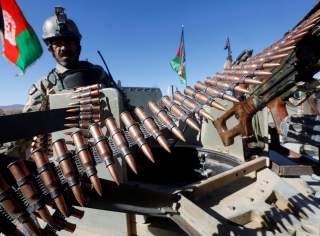Peace in Afghanistan? Don't Count On It.
A welcome and long overdue complete departure of U.S. forces will require facing up to some uncomfortable truths.
Myth #3: Russia and China want us to leave Afghanistan.
Both Moscow and Beijing are intensely concerned about Islamic radicalism in Central Asia. For that reason, both have been reasonably supportive of the continuing U.S. presence there. In fact, Robert Kaplan recently argued in the New York Times that the U.S. war in Afghanistan amounted to support for both Chinese and Russian initiatives in Central Asia. To state the obvious, U.S. taxpayers should not be subsidizing the security of rivals.
Myth #4: Europeans don’t have the stomach to fight in Afghanistan.
NATO allies have been rather good lately at shouldering the burden in Afghanistan. This makes sense actually since these countries are directly impacted by the war there. If the war gets worse, more Afghan refugees will flood westward into Europe. That points to the obvious fact that Europeans should lead whatever effort continues in Afghanistan, instead of Americans. Thinking more realistically, however, Europe would also ultimately be better served by a complete “reset” of Afghanistan policy.
Myth #5: Peace talks will end the bloodshed, permitting a graceful U.S. exit.
The odds of peace talks yielding a successful outcome are very low. A much higher probability is that the whole edifice of American involvement will come crashing down amidst considerable chaos and violence—think Saigon circa 1975. True, U.S. diplomat Zalmay Khalilzad is hard at work negotiating with the Taliban and some kind of agreement could be forthcoming very soon. Still, it’s worth recalling that the Paris Peace Accords that the U.S. signed with North Vietnam in 1973 had little appreciable impact on the ground other than to provide a “fig leaf” of honor to allow the full withdrawal of American forces. Within less than two years, the American-sponsored regime in South Vietnam was no more. But is this example so terrible? Today, after all, Ho Chi Minh city (formerly Saigon) is a rather nice place to visit somehow. Moreover, U.S.-Vietnam relations continue to bloom. Indeed, it is not so shocking, because revolutionary regimes tend to mellow in their dotage and the same would likely be true of a Taliban regime if one resulted from a total U.S. withdrawal. In the final analysis, America must have the “guts” to let the Afghans sort out their internal squabbles on their own. It’s going to be ugly, for sure, but Afghanistan itself and the wider global community will likely be better off. Civil wars must be permitted to end. It would be yet another example of extraordinary hubris to assume that Washington can ultimately determine the outcome of Afghanistan’s civil war.
U.S. military sources have said that Moscow is supporting the Taliban, but Moscow has vociferously denied the allegation. I have no special information in this regard, although such is the logic of great-power competition that it could be conceivable today. If we repeatedly call Russia an “adversary,” then Russia will likely oblige us and actually morph into our true enemy. Indeed, the United States is now providing “lethal aid” to Ukrainian government forces engaged in combat in and around the Donbass. So, why wouldn’t the Kremlin retaliate by supporting America’s foes with lethal aid in Afghanistan? An eye for an eye, right? Revenge, moreover, for Russians still smarting from their humiliation on that same blood-soaked battlefield in the 1980s, cannot be far from the Kremlin’s calculus. But again, that is all speculation, and I actually believe that Russia’s attempt to bring the warring parties together in Moscow during the fall of 2018 for peace talks was a sincere effort to end the carnage. Russia has much more to gain from peace and stability in Central Asia than from continued war, spreading radicalism, and terror.
Sadly, it is doubtful that any current American leaders could stomach pulling the plug on the slow-motion fiasco that is the war in Afghanistan today. Just look at how difficult it has been for President Trump to try to wind down the comparatively small U.S. military commitment to Syria. Afghanistan now requires the “tough love” of being required to stand on its own, even if that entails intensified civil strife in the short run. After all, Americans have much more pressing needs than pouring more of its precious blood and treasure into the remotest and most forbidding part of Inner Asia.
Lyle J. Goldstein is a research professor in the China Maritime Studies Institute at the United States Naval War College in Newport, RI. In addition to Chinese, he also speaks Russian and he is also an affiliate of the new Russia Maritime Studies Institute at Naval War College. You can reach him at [email protected]. The opinions in his columns are entirely his own and do not reflect the official assessments of the U.S. Navy or any other agency of the U.S. government.
Image: Reuters

